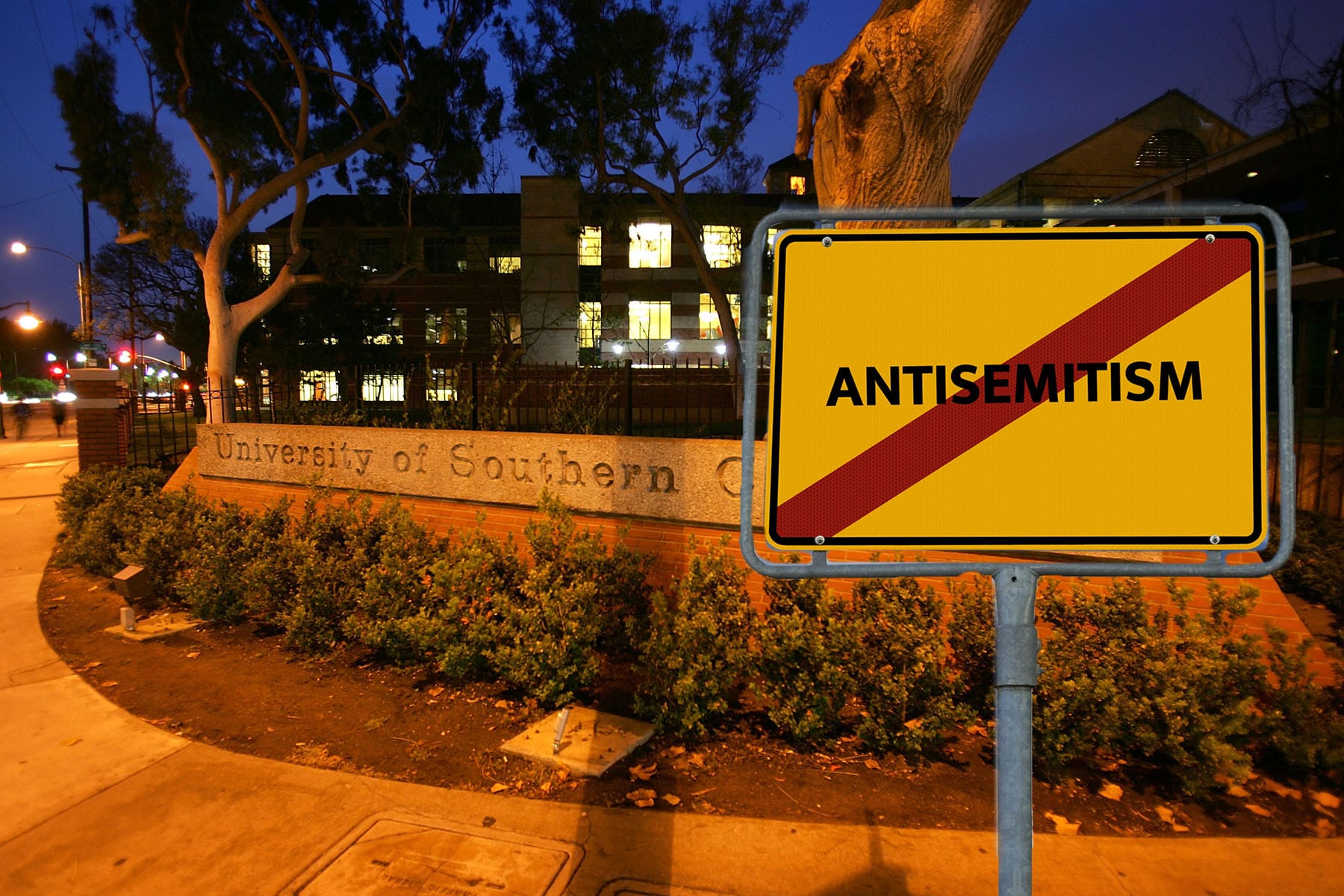 (Photo by David McNew/Getty Images)
(Photo by David McNew/Getty Images) USC issued a statement on December 28 denouncing antisemitism after the university made the Simon Wiesenthal Center’s annual Global Antisemitism Top Ten list.
The Wiesenthal Center ranked USC ninth on the list over their handling of student Yasmeen Mashayekh, a student Diversity, Equity and Inclusion senator at the Viterbi School of Engineering who has tweeted about wanting “to kill every motherf—ing Zionist,” “Death to Israel,” among other tweets. “Not even the fact that over 60 faculty members at USC recently signed an open letter … urging officials to rebuke Mashayekh has moved USC to take real action to remove her,” the Wiesenthal Center list stated. “At a time when special efforts are being made to protect and encourage minorities, USC President Carol [Folt] gets an ‘F’ for allowing this travesty to continue.”
In response, the university said in a statement sent to reporters: “President Folt and the USC Board of Trustees have publicly and unequivocally denounced antisemitism in all its forms and are committed to creating an environment which is safe for our Jewish community.
“The university understands why students, faculty and staff have felt unsafe following a series of hateful tweets that called for violence against both Jews and Zionism, which is an important part of the identity of many Jewish people. The tweets in question violated USC’s community values and we have addressed that with the student, consistent with California law.” They added that they “are committed to strengthening the Jewish community at USC and ensuring that our campus is free of hate speech.”
USC Board of Trustees President Rick J. Caruso also said in a statement, “As I said earlier this month, the Board of Trustees together with President Folt unequivocally rejects antisemitism. We explicitly condemn and denounce tweets calling for the killing of Jews. This kind of hateful speech has no place at USC or anywhere in society.”
Associate Dean and Director of Global Social Action Agenda at the Simon Wiesenthal Center Rabbi Abraham Cooper acknowledged in a phone interview with the Journal that USC’s statement was “a strong statement against antisemitism” but “we’re looking for action against antisemites, and that’s totally lacking.” He also criticized the university for having “trouble uttering the word ‘Zionist.’” “They’re worried what the woke folks are gonna be saying … if they [the university] say, ‘No no, Zionism is the national liberation of the Jewish people and people have every right to pursue it,’” Cooper said.
USC’s statement was “a strong statement against antisemitism” but “we’re looking for action against antisemites, and that’s totally lacking.”
If USC can’t figure out a way to hold Mashayekh accountable, Cooper added, they “should get a team in there that can, because we do not accept the status quo.”
USC Chemistry Anna Krylov, one of the faculty members who signed the letter calling for the university to rebuke Mashayekh, told Jewish New Syndicate (JNS) that while the university’s statement did say that Zionism is integral to Jewish identity, it needed to be on a public platform.
“We are still waiting to hear whether Israeli and Zionist students and those who support the right of the State of Israel to exist are welcome on campus,” she said. “It is also not clear what concrete actions to improve the campus climate will be taken. So far we have heard a lot about various task forces but not much about actions.”
Judea Pearl, Chancellor Professor of Computer Science at UCLA, National Academy of Sciences member and Daniel Pearl Foundation President, also told JNS that Folt at first “couldn’t spell Zionism. Then she finally spelled it but not on an official letter.” He added that Folt might simply be trying to avoid “political controversy.” “She may be afraid of CAIR’s (Council on American-Islamic Relations) lawyers or maybe some other source of criticism, but that’s why she is hesitating and this is what we need here. Zionism is not taking sides. It’s just moral imperative—and I say it very clearly—people who believe in the right of Jews to have a homeland.”
In a December 14 article, The Los Angeles Times quoted Mashayekh as saying that she doesn’t “feel safe on campus,” claiming that she is being subjected to “targeted harassment” and that the university has not adequately responded to her concerns. She also said she was removed from Virterbi’s website and is concerned about future employment opportunities and her loan payments. “I just really wish I didn’t have to think about what I would change. I wish people didn’t expect Palestinians to be the perfect victims.”























 More news and opinions than at a Shabbat dinner, right in your inbox.
More news and opinions than at a Shabbat dinner, right in your inbox.